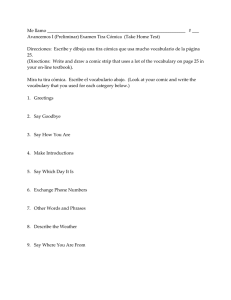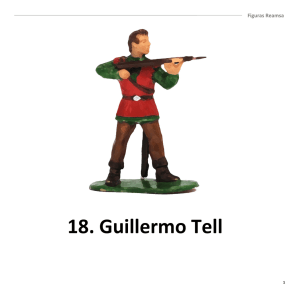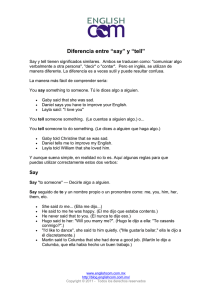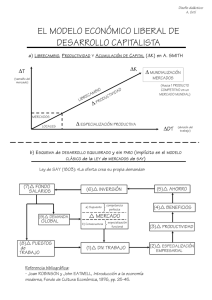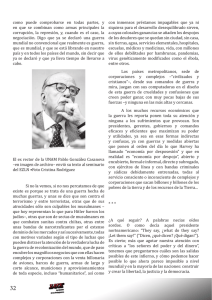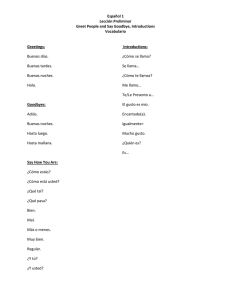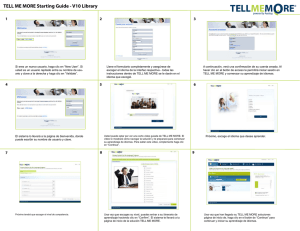How to differentiate between SAY and TELL
Anuncio
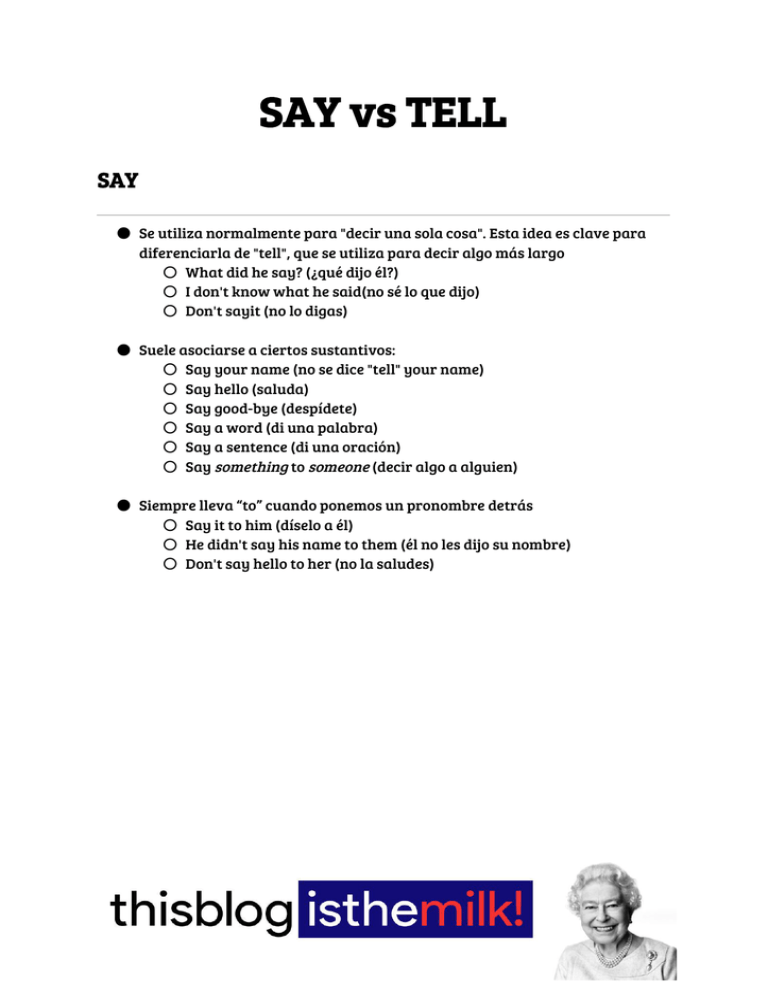
SAY vs TELL SAY ● Se utiliza normalmente para "decir una sola cosa". Esta idea es clave para diferenciarla de "tell", que se utiliza para decir algo más largo ○ What did he say? (¿qué dijo él?) ○ I don't know what he said(no sé lo que dijo) ○ Don't sayit (no lo digas) ● Suele asociarse a ciertos sustantivos: ○ Say your name (no se dice "tell" your name) ○ Say hello (saluda) ○ Say good-bye (despídete) ○ Say a word (di una palabra) ○ Say a sentence (di una oración) ○ Say something t o someone (decir algo a alguien) ● Siempre lleva “to” cuando ponemos un pronombre detrás ○ Say it to him (díselo a él) ○ He didn't say his name to them (él no les dijo su nombre) ○ Don't say hello to her (no la saludes) TELL ● Se usa para decir algo más largo. Se parece a "contar", pero dependerá de cómo traduzcamos la oración ○ Who told you that? (¿quién te dijo eso?) ○ He is going to tell us what happened (nos va a contar lo que ocurrió) ○ Did she tell you what the problem was? (¿te dijo cuál era el problema?) ● También se utiliza para dar órdenes o informar ○ I told you not do that (te dije que no lo hicieras) ○ My mother told me to clean up (mi madre me dijo que limpiara) ○ I'm telling you to shut up (te estoy diciendo que te calles) ● A diferencia de "say", "tell" no lleva "to" delante del pronombre ○ He told me that ● Tal y como ocurre con “say”, “tell” se asocia a ciertos sustantivos ○ Tell the time (decir la hora) ○ Tell a story (contar una historia) ○ Tell a joke (contar un chiste) ○ Tell a lie (decir una mentira) ○ Tell the truth (decir la verdad) ○ Tell the difference (notar la diferencia) Otras palabras según contexto MEAN ● Esta palabra se utiliza en la expresión “significar” y "querer decir". ○ What do you MEAN? (¿qué quieres decir?) RUN ● Normalmente seguida de “as” en muchos documentos ○ The contract run as follows (el contrato dice lo siguiente) REMARK AIMED AT ● Significa "comentario" y "apuntar", pudiéndose traducir por "decir” ● Nota : "Aim" puede ser verbo" apuntar" o sustantivo "objetivo" ○ Is your remark aided at me? (¿lo dices por mí?) ○ His remark was aimed at me for sure (seguro que lo decía por mí) WORDS FAIL (SOMEONE) ● Significa “no saber qué decir” ○ When I asked him about his girlfriend, words failed him (cuando le pregunté por su novia no supo qué decir) TO KEEP SILENT ● Significa “no decir nada” ○ When I asked them they kept silent (cuando les pregunté no dijeron nada) TO GO ● Se utiliza para hablar sobre letras de canciones ○ There is a song that goes: "Mary had a little lamb" (hay una canción que dice…) Ejercicios ● Nos dijo que no lo hiciésemos _____________________________________________________________________ ● Por favor, dime la verdad _____________________________________________________________________ ● ¿Lo dices por ella? _____________________________________________________________________ ● Nunca sabe qué decir _____________________________________________________________________ ● La canción dice: "Love, love, love" _____________________________________________________________________ ● La carta dice lo siguiente… _____________________________________________________________________ ● Cuando les preguntamos no dijeron nada _____________________________________________________________________ ● ¿Qué quieres decir? _____________________________________________________________________ ● Di una palabra _____________________________________________________________________ ● Cuéntame esa historia _____________________________________________________________________ ● Díselo a él _____________________________________________________________________ Respuestas: He told us not to do it Please, tell me the truth Is your remark aimed at her? Words always fail him/her The song goes: Love, love, love The letter runs as follows: When we asked them they kept silent What do you mean? Say a word Tell me that story Say it to him/Tell him http://www.englisch-hilfen.de/en/exercises/confusing_words/say_tell.htm https://www.englishclub.com/vocabulary/cw-say-tell_quiz.htm http://a4esl.org/q/h/vm/tellorsay.html
